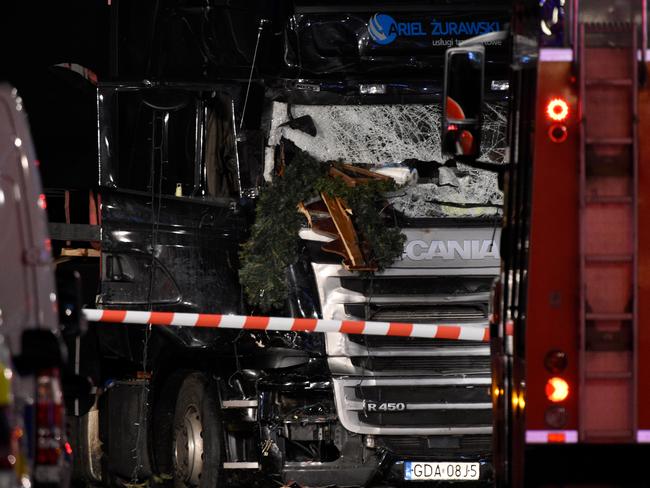Weakness is not an option in this struggle for our culture and society against terror attacks
THE attack in Berlin is another reminder that we’re engaged in a struggle for our culture and society and weakness is not an option, writes Peter Jennings.

- Foiled Melbourne terror plot ‘inspired by ISIS’
- Mark Steyn: 12 Germans killed due to reckless Western leaders
- Rita Panahi: Stand up for Christians who are under siege
- ‘The terrorists are not going to win’
- Read this first before you go to Europe
TEN days before the truck attack in Berlin, I walked through the Christmas market at the Kaiser Wilhelm Memorial Church. A small ferris wheel lifted excited children into the afternoon air while parents drank mulled wine, ate currywurst (sausages with curry sauce) and browsed stalls with Christmas decorations and Berlin souvenirs.
The square around the church was once regarded as the heart of West Berlin when the city was divided between Soviet-controlled East Germany and the West. The Kaiser Wilhelm church had been bombed out by the Allies in 1943 and the shell of the bell tower, which some Germans call the “hollow tooth”, has been preserved as a monument to peace.
The driver of the truck that killed and injured so many people last Monday may not have known the history of his target area but, symbolically, he struck at a place many Germans regard as the heart of their country.

As with the rest of Berlin during my short visit, the police presence was low-key or non-existent, a far cry from the heavily armed police visible in Paris or London. Security at Berlin’s Tegal airport is minimal. A tiny container of eye-drops that I forgot to pack with my liquids held me up in London Heathrow’s security line for 30 minutes while the rest of my luggage was searched. In Germany you are more likely to be waived through with limited bag checking and barely a glance at your passport.
Post-war Germany prides itself on its liberal and tolerant values but, like so many countries, including Australia, Germany will now take steps to harden itself against a growing terrorist threat.
Across Europe the hunt is on for a Tunisian man, Anis Amri, 24, who is linked to the atrocity because a wallet with his identity papers was found in the cab of the stolen truck used in the attack.
Amri had been granted temporary asylum in Germany in April but had been under surveillance by German authorities on suspicion that he might commit extremist acts of violence.
The surveillance effort had only recently ended. Amri had done jail time in Italy for setting fire to a school and had been sentenced in absentia to jail in Tunisia for violent crimes. He was facing deportation from Germany but that had been delayed pending him getting a valid Tunisian passport.
German newspapers are reporting that Amri had lived with and was otherwise linked to individuals who had preached extremist views, recruited fighters and raised money for the so-called Islamic State terrorist group.

This story echoes many elements of past terror attacks in Europe and elsewhere in the past two years. It is almost never the case that attackers are really “lone wolves” — people who radicalise in isolation by reading Islamist extremist propaganda on line.
A different pattern emerges from looking at the detail of recent attacks. First, the attackers are very often known to the police, have violent criminal pasts and have served time in jail. Second, national authorities are usually worried about the risk that individuals will suddenly flip from being nasty petty criminals to being nasty violent Islamist extremists.
THE challenge for hard-pressed police and intelligence services everywhere is that they don’t have the manpower to watch every angry nutcase on their books.
A third common feature is that attackers are usually linked to a network of like-minded people. In Amri’s case he was associating with people who had direct connections to Islamic State terrorists.
IS has already claimed the attacker as one of its own. While the group will do that in cases like the truck attack in Nice last Bastille Day when the driver had no real link, the fact is that IS has a strong network in Europe and North Africa and is putting priority on building those connections.

A final common theme in the attacks is that we see European countries struggling to achieve effective counter-terrorism co-operation. Easy movement across borders, limited and ineffective intelligence co-operation between some governments and, in Germany, a reluctance to hand too many powers to security services all make life easier for terrorists.
In Germany, the political fallout from this attack will make it more challenging for Chancellor Angela Merkel to win the national elections next October. It’s way too soon to dismiss her chances because her trademark brand of calm assurance will help to manage the very difficult German debate about how to counter violent extremism.
It’s clear, though, that Germany will have to get tougher quickly with a more visible police presence in cities, stronger security around big public events and more effective means to handle persons of interest to the security services, like Amri.
It’s often claimed that nothing can be done to stop random attacks using trucks but sensible steps can and should be taken. Vehicle access to public areas can be limited with barriers. Most trucks have GPS systems and the technology exists to disable stolen vehicles.
Additional security measures cost money and will never be foolproof but, just like Australia, Germany’s leaders will find there is an increasing public demand to make public places more secure.
This will inevitably happen even as Europe faces the certain prospect of more terror attacks in the near future.
Peter Jennings is the executive director of the Australian Strategic Policy Institute and a former deputy secretary for strategy in the Department of Defence



